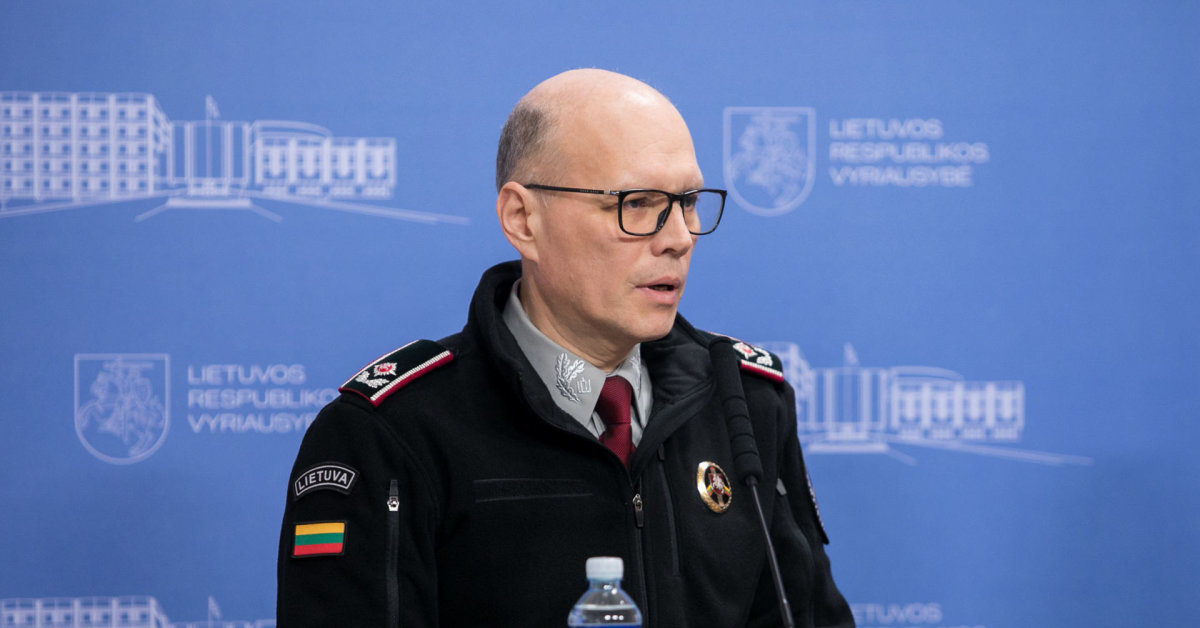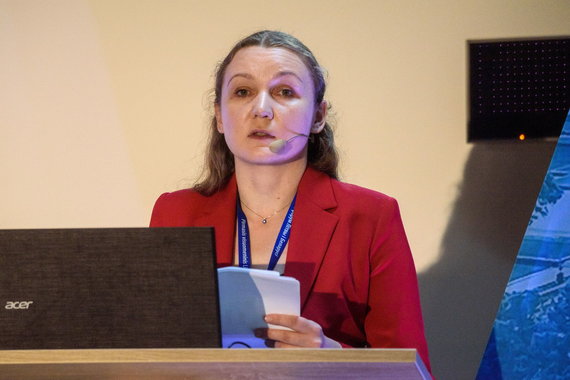
[ad_1]
The head of the State Border Guard Service (SBGS), Rustamas Liubajev, reported during a meeting of the opposition faction Union National-Democratic Lithuanian Christians on Monday that from August 11 to September 3, 14 Belarusian citizens had applied for asylum in Lithuania. .
“They are currently in the process,” said the commander.
Evelina Gudzinskaitė, Director of the Migration Department, said that among the asylum seekers there were participants in demonstrations against the Aliaksandr Lukashenko regime, others simply feared persecution.
Asylum decisions take up to three months, depending on the situation, and more complex cases up to six months.
According to the director of the Migration Department, Belarusians rarely apply for asylum in foreign countries.
“Most of them just want to escape from that unsafe situation and wait in silence. … They don’t want to apply for asylum,” said E. Gudzinskaitė.

Photo by Algirdas Kubaitis / Evelina Gudzinskaitė
During the mentioned period, for special humanitarian reasons, 37 Belarusian nationals arrived in Lithuania with the permission of the Minister of the Interior.
“Belarusian citizens who have reason to believe that life and safety and their families are in danger due to their participation in political activities or protests, such persons can enter the territory of the Republic of Lithuania for special humanitarian reasons,” said SBGS commander.
The decision to open that channel for Belarusians has been taken by the Government of Lithuania.
According to R. Liubajev, if such people do not have a national Schengen or Lithuanian visa, they are issued a type C visa at the border crossing, which can remain in Lithuania for 15 days.
According to R. Liubajev, Belarusians choose Poland and Latvia less often than Lithuania. Following the presidential elections in Belarus, four Belarusian citizens applied for asylum in Latvia, 18 in Poland and 12 more for special humanitarian reasons.
According to the head of the SBGS, the border guards are dealing with the flow of Belarusians so far, but if it suddenly increases drastically and there are more than a thousand refugees, the problem should be addressed as an emergency.
“We are preparing for that possible scenario, we have evaluated our possibilities, where it would be possible if there were so many people who could accommodate them. Our possibilities are limited, if the flows increase, the problem must be solved with the help of the institutions of the European Union, firstly, the European Border and Coast Guard Agency FRONTEX would help ”, said R. Liubajev.
Interested in Lithuanian visas
The head of the Migration Department, for his part, said that as many Belarusians have been arriving in Lithuania as before, there has not been an increase in traffic.
She predicted that citizens of the neighboring country may be interested in Lithuania’s decision to issue national visas to Belarusians for up to six months.
“There has been a slight increase in calls about how they could come to Lithuania and how they could settle here,” said E. Gudzinskaitė.
According to the head of the Migration Department, visa requirements have also been relaxed.
“Very few supporting documents will be needed to obtain these visas. Basically there is medical insurance, the requirement for funds has been reduced … In addition, the Belarusian himself or the employer will be able to prove those funds,” he said.
“This will be the channel for Belarusians who do not want to apply for asylum to come to Lithuania,” added E. Gudzinskaitė.
There is basically medical insurance, the requirement for funds has been reduced (…). In addition, such funds will be able to prove the Belarussian himself or the employer.
He also announced that a procedure came into effect on Monday whereby highly-skilled Belarusian workers could complete an application for a residence permit in Lithuania online while still in their home country.
“This makes it possible to obtain a residence permit very quickly, that is, a blue card. If the application is examined urgently, a decision can be made within 15 days, ”said E. Gudzinskaitė.
Imitated a wall
The SBGS commander also reported on Monday that after the presidential elections, their security was monitored on the border between Belarus and Lithuania.
Liubayev said that Belarusian border guards appeared more frequently at the border and were joint patrols of border guards and soldiers.
“However, since September 1, when the active training phase at the Goza training ground ended, we have noticed a decrease in those actions again,” he said.
Lithuanian border guards also noted that officials from the neighboring country had erected a Lithuanian state border sign on their territory.
“That practice, the imitation of the state border, is the tactic they have chosen, apparently to deceive the perpetrators and to be able to react and arrest those people if they try to leave the Republic of Belarus,” explained the border commander.
According to him, in the past, such tactics were used in the Soviet Union.
Lithuanian officials reached out to their colleagues in Belarus regarding this event and a meeting was held to discuss the event.
Belarus has been protesting for a month since the August 9 presidential elections, which were won by authoritarian leader Lukashenko, who has ruled the country since 1994. The opposition and Western countries consider these elections to be rigged.
Mass protests in the country are being forcibly suppressed and the EU is considering imposing sanctions on regime officials responsible for the violence and electoral fraud. Last week, the Baltic states imposed sanctions on Belarusian President Lukashenko and 29 other members of the regime held responsible for electoral manipulation and violence against peaceful protesters. They have been banned from entering Lithuania, Latvia and Estonia for five years.
[ad_2]